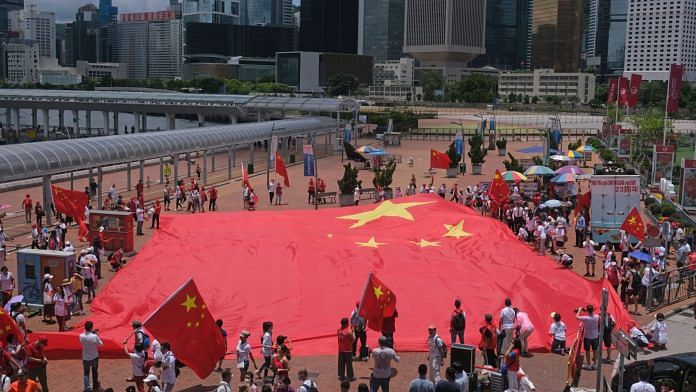The decision made by the National People’s Congress or the NPC to “improve Hong Kong’s electoral system” will ensure “patriots administering Hong Kong” and sustained development of “one country, two systems,” said Chinese Premier Li Keqiang at a press conference on 11 March.
The recently concluded session of the NPC in Beijing has one clear message for Hong Kong: China will promote those Hong Kongers whom Beijing considers “patriotic”.
The Hong Kong Special Administrative Region has enjoyed relative autonomy due to the Sino-British Joint Declaration – recognised by the United Nations. The treaty will expire in the year 2047.
The NPC’s decision on improving the electoral system of the Hong Kong Special Administrative Region will bring about sweeping changes to Hong Kong’s electoral system by increasing the Election Committee members from 1,200 to 1,500. The Election Committee is responsible for electing Hong Kong’s Chief Executive. Beijing has hinted that the new decision will promote patriots’ entry into the Election Committee and exclude those with pro-democracy leanings.
“This closes a major loophole that existed in Hong Kong’s electoral system, preventing anyone who advocates separatism or Hong Kong “independence” from being a candidate in any Hong Kong elections,” said Li Huan, an associate professor on Hong Kong and Macao Studies at China Institute of Contemporary International Relations.
Also read: ‘If China has nothing to hide, show it to us’ — Blinken on alleged genocide against Uyghurs
The clampdown
The crackdown on Hong Kong’s pro-democracy movement began earlier in 2020, with the National Security Law restricting protests across the city. China has used the National Security Law to crush the pro-democracy movement by arresting leading politicians.
On 6 January, Hong Kong police arrested 53 pro-democracy politicians and campaigners under Beijing’s new National Security Law. Those arrested are accused of trying to “overthrow” the government in Hong Kong — among other charges. Several other activists and journalists have been charged for participating in the 2019 pro-democracy protests.
China has tried to normalise the electoral decision on Hong Kong by calling it Beijing’s “internal affair”.
“We urge relevant sides to face up to the reality that Hong Kong returned to China 24 years ago, abide by international law and norms governing international relations and immediately stop interfering in China’s internal affairs including Hong Kong affairs” Chinese Foreign Ministry spokesperson Zhao Lijian said on 15 March.
Also read: Chinese Communist Party has goals. India needs to have its own, not just respond to aggression
Curbing the powers
The new rules will ensure that pro-democracy candidates don’t get elected to the Legislative Council by setting up a “Candidate Qualification Review Committee”. Hong Kong’s relative autonomy was guaranteed by Hong Kong’s Basic Law and the electoral system, which granted its residents the right to elect candidates for the Legislative Council and uphold the Basic Law as their representatives. The new rules, in all likelihood, will bar the entry of any pro-democracy figures from the race of Chief Executive by empowering the Election Committee – and reducing the overall powers of Legislative Council.
The central element of the Hong Kong electoral decision is that Beijing wants to work towards “ensuring the administration of Hong Kong by Hong Kong people with patriots as the main body” and remove “anti-China, destabilising elements”.
Following the NPC session, a hashtag ‘Hong Kong youth’s fight for Hong Kong independence’ clearly organised’ trended on the Twitter-like social media platform, Weibo. Another hashtag that trended on Weibo was ‘Hong Kong’s brothers support governance by patriots’, which also included a video of a young “patriot” named He Weijun — who is seen arguing with a relatively old pro-democracy activist. The hashtag was viewed 96.93 million times on Weibo. In the video, viewed over 6.1 million times on Weibo, He Weijun accuses the pro-democracy activist of using freedom of speech to “create chaos” in Hong Kong. The video is heavily edited and doesn’t quite show the complete response of the pro-democracy activist.
Another case of the tussle between Beijing and Hong Kong is the story of 200 Hong Kong civil servants who have refused to sign a declaration pledging to uphold Hong Kong’s Basic Law and the new National Security Law. According to Patrick Nip, a Hong Kong government official, the civil servants who refuse to sign the declaration will be asked to resign.
The declaration is considered an attempt by Beijing to reign in on the Hong Kong civil servants that may have pro-democracy leanings.
Also read: Quad’s careful joint statement shows India has to accept double-laning of world with China
The endgame
China’s end game in Hong Kong may be to transform Asia’s hub of financial markets into another Special Administrative Region of Macao – with “patriotic” lawmakers. The Chief Executive in Macao – even though elected – has to be approved by Beijing. This gives Xi Jinping unrestricted control over the city’s affairs, known as one of Asia’s gambling hubs.
Jonathan Robison of Centre for Strategic and International Studies has argued that “one country, two systems” “should not be seen as a framework for full liberal-democracy”. Robinson adds that “one country, two systems” was always an unwritten understanding about what the Communist Party of China can tolerate. The pro-democracy movement in Hong Kong had hoped for continuing the SAR’s autonomy, but China has significantly changed under Xi Jinping.
If the tensions between the US and China continue to simmer and transform into a full-blown ‘Cold War’, Hong Kong would be at the heart of the rivalry between the two powers.
Hong Kong’s plight is a metaphor for the current moment. China’s astute interpretation of “one country, two systems” is at loggerheads with democratic values that many in Hong Kong – and around the world – aspire to promote.
For now, China hopes that NPC’s decision will put “patriots” in power and push the pro-democracy movement towards a relative decline.
The author is a columnist and a freelance journalist. He was previously a China media journalist at the BBC World Service. Views are personal.



